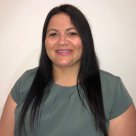Asking and clarifying people’s pronouns has become more common, and for some, correct pronouns can even be lifesaving.

That’s why one Nova Scotia Mi’kmaw speaker is suggesting everyone adopt a Mi’kmaw word.
In the Mi’kmaw language, the word ‘nekem’ is a gender neutral verb and refers to “that person.”
“It encapsulates all the pronouns in English. There is just one in Mi’kmaw and it’s not gendered. You are directly referring to that life force and that person,” said Tuma Young, the 2022 Pride Ambassador for the Halifax Pride Society.
Now that Mi’kmaw has been recognized as the first language of Nova Scotia, Young suggests everyone give the word a try.
“Then there’s no need to misgender anybody because you’re not. It refers to everybody all on the gender spectrum,” said Young.

Get breaking National news
Feeling like they weren’t male or female during adolescence, Hayden O’Malley started using they/them pronouns in junior high. They say being misgendered feels like they are in an unsafe space.
“For queer or trans kids I know that pronouns are lifesaving and if you use the right pronouns for someone, it can make or break their day,” they said.
“If a youth is continuously being misgendered by their classmates or their family or something, that can lead to so many mental health issues, or physical health issues.”
Proper pronoun etiquette is not assuming one’s gender based on appearance and O’Malley said you can use them/them for anyone as a gender-neutral pronoun.
“You probably have picked up someone’s lost keys before and been like, ‘Oh no, someone lost their keys’ because you didn’t know their gender,” they said.
Tamsin Robson, who uses they/she pronouns, said it is vital to understand that language is constantly evolving.
“It adapts to the times it adapts to our understanding of our own humanity and so to recognize these things, learn these things and don’t be afraid to ask for guidance. Don’t assume, always ask,” Robson said.
“Trans and non-binary people spend most of their lives looking inside and discerning and interrogating themselves of what society expects of them and the least we can do is honour that journey.”









Comments